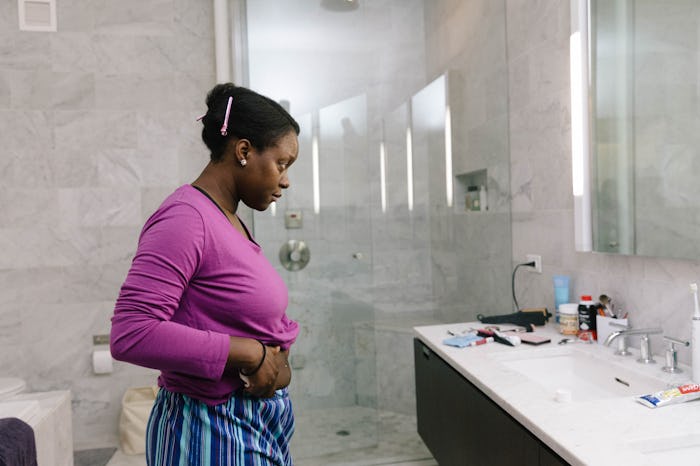Life
How Your Period & PMS May Change After Pregnancy, According To Science
It's hard to quantify just all the changes your body goes through with pregnancy. My hair got curlier, my skin got worse, my hips will never be the same. But it doesn't stop once the baby's born — the postpartum period can be full of changes, too. So what about your period and PMS? Is PMS different after pregnancy, or is it just as big of a pain as it was before?
I have always had horrible periods. I am the lucky host of not one, but two reproductive disorders: polycystic ovary syndrome and endometriosis. In fact, at my last doctor's appointment, my doctor looked at me and said, "You have endometrial tissue." She then waved a hand indicating basically my whole lower torso and said, "There." Thanks, doc. What's difficult to imagine is that pregnancy actually improved my endometriosis. According to The Journal of Assisted Reproduction and Genetics, this is not uncommon, and it's because of the dump of progesterone into the body during pregnancy, which suppresses the growing of endometrial tissue.
What about women without my crappy genetics? It's hard enough becoming a mom without the worry of your cycle shifting. While no one likes getting their period, many women have a pretty regular cycle that they've come to be able to reliably predict and work around. My cycle, however awful, is reasonably predictable, so I know when to hit the wine store and when to order my tampons on Amazon. Is PMS different after pregnancy for most women, though?
According to the Cleveland Clinic, it can go either way. Some women report improved, easier periods, like me. However, some women find that the symptoms of PMS and their periods have turned into somewhat of massacre down there. When I was talking to a group of girlfriends about this article, there was a fair bit of difference among us.
For one of my friends, Amy Cissell, 40, it's been particularly challenging. She also has endometriosis, and the changes have not been pretty. Like me, she enjoyed a period of reduced pain and suffering, but it wasn't to last.
"For the first couple years, it was a thing of almost joy. Light and infrequent. Then, hell broke forth from my loins and now, every 12 to 20 days, it's more reminiscent of the leavings in an abattoir than the teaspoon of blue liquid so common in cutesy period commercials. And don't even get me started on the pain," she tells Romper.
Meanwhile, Erin Jones, 31, tells Romper, "I don't know if I'm too busy to notice that I have PMS, but until the day of my period, I'm OK. It's gotten a lot better since Pip was born, but I'm still breastfeeding."
The Cleveland Clinic wrote that the way your body reacted to pregnancy has a lot to do with how or if your period will change. For instance, some women find that their thyroid levels increase or decrease after pregnancy, changing the quality and duration of their PMS. They also found that certain structural changes that happen in some women after pregnancy have an even greater effect on PMS. Some women develop something called adenomyosis, which is similar to endometriosis, but develops in a predictable pattern into the muscular wall surrounding the uterus, according to The Mayo Clinic. This can cause really terrible PMS with pain and bloating.
It's not just the pain that gets to women during PMS. A major problem of PMS after pregnancy is the emotional aspects of the syndrome. According to The Archives of Women's Mental Health, the hormones in your body postpartum, combined with the hormones released during PMS can lead to increased rates of postnatal depression and depressive thoughts.
Childbirth isn't easy on your body, and the effects of pregnancy and childbirth are as unique as the women giving birth. If your PMS is really bothering you, or if you're feeling more blue than you would normally, reach out to your provider to discuss your options.
